Site Menu:
| This is an archived Horseadvice.com Discussion. The parent article and menus are available on the navigation menu below: |
| HorseAdvice.com » Horse Care » Equine Nutrition, Horse Feeds, Feeding » Minerals and Electrolytes for Horses, an Overview » |
| Discussion on Chromium Suplementation | |
| Author | Message |
| Member: Caroltd |
Posted on Thursday, Oct 19, 2006 - 1:49 pm: I've been told by our vet to start supplementing our 18 year old PaintX mare with Chromium after her insulin resistance test results came back "41.4" (I understand the normal range is 8-30). I've always had confidence in our vet's recommendations and I'm not questioning his effort to rectify this...however your article on minerals indicated that Chromium supplementation has not shown good results in these cases. Am I misunderstanding the article or??? |
| Member: Scooter |
Posted on Friday, Oct 20, 2006 - 1:14 pm: Carol, I have mine on a chromium/ magnesium supplement, I don't know if it works, probably not. My vet suggested chromium also, but he said exercise is the most important thing to maintain these horses, followed by a correct diet. Quite a challenge, but once you figure it out it isn't too hard. Good Luck |
| Moderator: DrO |
Posted on Saturday, Oct 21, 2006 - 8:17 am: No you read it correctly. There is scientific research that suggests that chromium has a beneficial effects on insulin sensitivity however there is also veterinary research that finds this measured benefit is not significant when actually used.DrO |
| Member: Caroltd |
Posted on Monday, Oct 23, 2006 - 9:33 am: Thank you. I guess I'll go ahead and supplement her on a test basis and see if it reduces the crestiness and fat pads the vet is concerned about. I will update this discussion in a couple of months as to whether it helped or not. Also, Diane, I will try to follow your suggestions regarding more exercise for her (although that's going to be tough in NE in the winter...we don't have an indoor..and the footing gets rough). Maybe hand walking for longer lengths of time will have to do.Diane would do you do for diet control? Thank you both again for your responses. |
| Member: Scooter |
Posted on Monday, Oct 23, 2006 - 1:36 pm: Hi Carol, I live in the mid west and our winters are terrible too. Through the winter I don't ride much, but if the footing allows i run them around the pasture.In the winter, they get good quality grass hay and 1# of lite balance pellets. If the ground is covered with snow, I feed a poor quality hay (stemmy & brown) along with their good hay to try and keep them busy. The thing that really helps is I weight tape them weekly, and write it down. They get so wooly it's hard to tell if they gain weight, until it's to late. What's worked for them is feeding 1.5% lb.s of hay to their body weight, so if they Should weigh 1000 lb's they get 15 lbs. of hay, and yes I have gotten so neurotic I weigh it! When it starts warming up, they get 1% of their body weight. They stay quite plump even on this regimen, and it does feel as if you're starving them, but this year they finally look good and the cresty necks are about gone  , and everyone is sound! Weight taping keeps me honest. Good Luck! , and everyone is sound! Weight taping keeps me honest. Good Luck!
|
| Member: Scooter |
Posted on Monday, Oct 23, 2006 - 1:52 pm: Here's my results doing this, keeping the weight down this summer was not easy. 1st pic is Jan - very fat and case of laminitis. 2nd is from May after the winter diet. 3rd is just recently. Avoided laminitis all summer!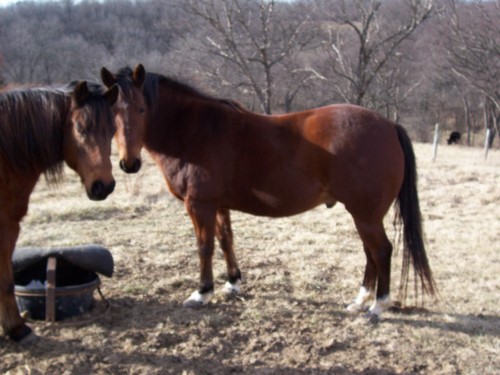 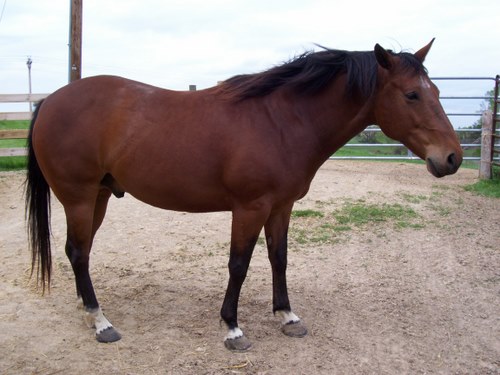 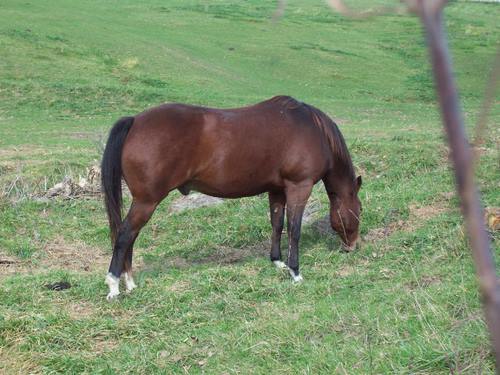
|
| Member: Caroltd |
Posted on Monday, Oct 23, 2006 - 2:44 pm: Wow, what a difference. Don't feel like "the lone ranger" on weighing hay. I've been doing it all along. I will take your advice about taping her on a regular basis to see if her weight is fluctuating wildly over the winter. Right now she is on a fair quality grass hay with a little beet pulp to mix her Thyro-L and join supplement with. When I look at your pics I keep thinking that our girl doesn't look much different than your Jan in the second set. So I'm not sure what our vet is looking to "fix" with the chromium other than the out of range test result. I'll talk with him again and make sure this is what we want to do. Thanks for your help. |
| Member: Caroltd |
Posted on Friday, Nov 10, 2006 - 11:38 am: Diane/Dr. O:Since we started the chromium supplementation I have been seeing a much greater water consumption than before. Did you see this result from the chromium? Is this a side effect of chromium? Our vet says this is a symptom of cushings. Taini's ACPH results were"38" as compared to a range of 8-35 in October (when we started the chromium). Our vet said this could be a seasonal change because it was so small but he was betting on cushings and wanted to put her on pergolide(sp), but my daughter felt that we should wait the winter out and test again in the spring before doing so (the mare is her's). She agreed that the insulin was out of whack and we should do something about that. I haven't seen any reduction in weight,fittness or anything else (of course I'm not sure what I should be seeing), just the increased water consumption. What now? |
| Member: Scooter |
Posted on Friday, Nov 10, 2006 - 5:14 pm: Hi Carol I didn't notice increased water consumption due to the chromium. I do know since they started eating more hay their water consumption has gone up. Is she getting more hay and less grass now?Articles I have read about insulin resistance have stated that they drink more also. Could you post a pic of her and maybe Dr.O. could give you an idea of her body condition. Have you looked at the body condition score article here? What would her score be? Does she have any problems like founder or non shedding etc. that you are having her tested? or is it the fat pads that have lead to your concern? I have a older gelding that has terrible fat pads on his butt, they even run down his leg some. He is a bit cresty, but in decent weight. In the summer I ride him alot and they go down some, but never go away. I had him tested also and his insulin was slightly high and cushings was neg. He doesn't shed in the spring and I must clip him. He is 17 yrs. old and healthy otherwise, so I have given up the idea that he will look normal as long as he is healthy. I do know clover is a problem with him and his fat pads blow up when he eats it, almost like an allergic reaction. Here's a pic of them, the 1st one is when I ride him often, the 2nd is when I don't, I call him bubble butt. The chromium didn't help his any at all. 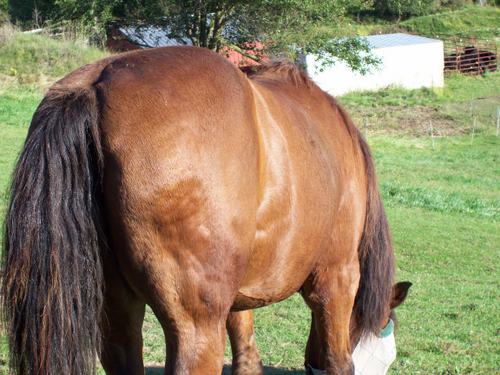 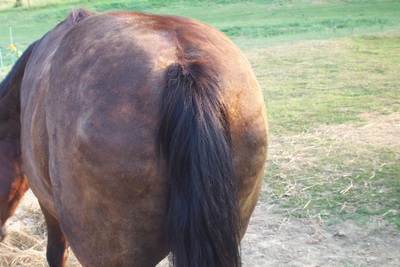
|
| Moderator: DrO |
Posted on Saturday, Nov 11, 2006 - 10:19 am: In case you have not be sure to read the articles in the Disease : Endocrine section on Cushings and Equine Metabolic SynDrOme.DrO |
| Member: Kpearson |
Posted on Monday, Nov 13, 2006 - 8:52 pm: Being fairly new at this, what type of scale is best for weighing hay? |
| Moderator: DrO |
Posted on Tuesday, Nov 14, 2006 - 6:07 am: Karen will you be weighing whole bales or small portions of the bale? In the case of the former a bathroom scale might be best while in the latter a large kitchen scale can be used on well formed flakes. If the hay is looser, suspended spring loaded scales can be used in all kinds on configurations.DrO |
| Member: Caroltd |
Posted on Tuesday, Nov 14, 2006 - 8:53 am: Karen:I only weigh flakes so I use an old baby scale. My Mom-in-Law gave it to me..she used it for my husband so its really old. It has an open ended basket top that the baby would have lain in. It weighs up to 25 pounds and holds the flakes securely. Carol |
| Member: Lilo |
Posted on Tuesday, Nov 14, 2006 - 6:43 pm: We could not find and old baby scale - that would be the easiest. I found a kitchen scale that goes to 20 lbs, and my husband attached a baking sheet to it with 4 screws so it can hold a flake of hay. I weigh my gelding's 7lb portion and my mare's 10 lb portion out on it. I am sure it is not totally accurate, but I am happy if I am within 1/2 pound.Lilo |
| Member: Scooter |
Posted on Tuesday, Nov 14, 2006 - 8:27 pm: I use the same thing as Lilo except I just put a box on it and zero it out, then add up to 20#'s of hay loose or flakes. |
| Member: Kpearson |
Posted on Wednesday, Nov 15, 2006 - 12:46 am: Thanks a bunch all of you, for all the information. I use 1/2 ton bales most of the time. Sorry I have been slow to respond, my 5 year old mare has been at the vets for a week now, she's been very sick. She went off her feed and water, just has acted sick. No signs of colic, or in pain. I am glad that I took her the night I noticed she hadn't touched her hay or grain. She has been on IV's. Tuesday when I took her, no fever, Vet couldn't detect any signs of impaction. Wednesday fever of 104. Slightly dehydrated but not bad. Put her on IV's and antibiotics. From Thursday on no fever still had not passed any stools since Tuesday. Blood work red and white cell blood count normal. Heart rate normal. They pumped mineral water into her Friday, Finally Saturday morning she went, and the stools were small and dry. Still not eating or drinking but looked brighter and more alert. Sunday acted very sick again, started diaria, poor thing. Her stall walls look like a war zone. Vet giving meds for that. Monday, didn't eat much or drink much. Took her off IV's. Tuesday morning I went to see her before work and she was eating, finally. I hope we have reached a turning point, but need to get diariha under control. They still don't know what she has or had. She is up to date on all shots. Her stall is between my other two horses and they are all happy and well. Vet still thinks it is something viral. My friends horse did the same thing last summer, went off food and water for about 10 days. Can mice transmit any viruses to horses, I noticed one that ran out of her stall. I have thought of every possible scenerio. Anyway I keep praying she pulls through. |
| Member: Paul303 |
Posted on Wednesday, Nov 15, 2006 - 1:38 am: Said those prayers myself, Karen. Did'em again just now, for you and your's. Luck! |
| Moderator: DrO |
Posted on Wednesday, Nov 15, 2006 - 6:39 am: Karen, the history suggests to me an impaction (initial period of no stools or fever) that became complicated by colitis (fever and diarrhea). There are impactions that cannot be palpated. For more on colitis see, Diseases of Horses » Colic, Diarrhea, GI Tract » Diarrhea in Horses » Inital Evaluation of Colitis in Horses.DrO |
| Member: Kpearson |
Posted on Wednesday, Nov 15, 2006 - 5:09 pm: Thanks DrO, I saw her again today, she is eating and looks so much better. Still has loose stools, so they tubed her with something for that. If we can get her to a somewhat normal stool, I can take her home Friday. I choose to keep her there so they can watch for signs of dehydration better then I. This web-site is great and I appreciate all those wonderful horsey well-wishing friends. |
| Member: Sunny66 |
Posted on Wednesday, Nov 15, 2006 - 6:37 pm: Karen, ask your vet about bio sponge... www.platinumperformance.comGood luck with your girl! |
is The Horseman's Advisor
Helping Thousands of Equestrians, Farriers, and Veterinarians Every Day
All rights reserved, © 1997 -
